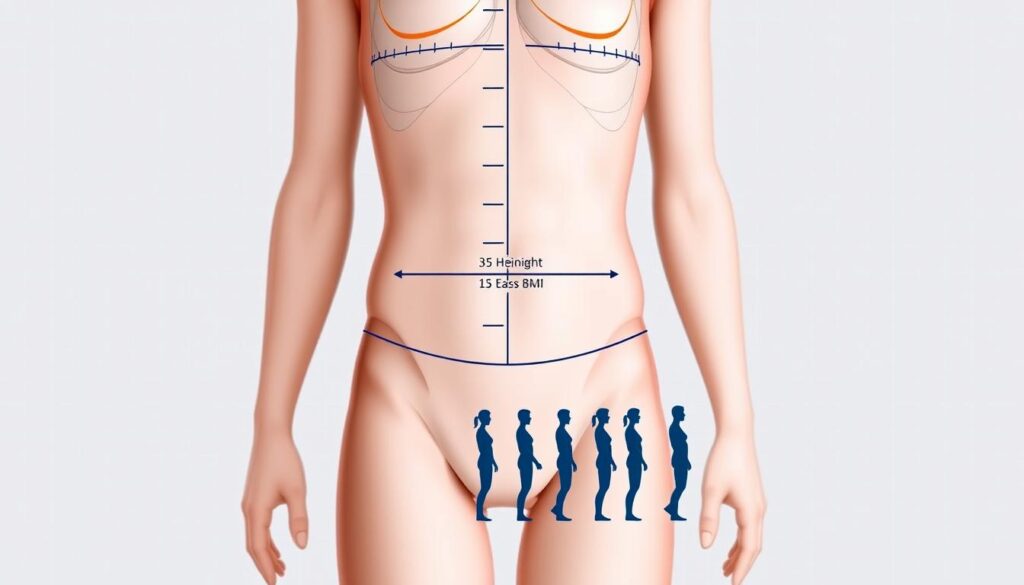Can a simple measure like Body Mass Index (BMI) really predict the effectiveness of intermittent fasting for weight loss? As we explore the relationship between BMI and intermittent fasting, we uncover the science behind this popular dietary approach.
Intermittent fasting has become popular for weight management and reducing heart disease risk. By understanding how BMI relates to intermittent fasting, we can see its potential benefits for our health.
Key Takeaways
- Understanding BMI is crucial for assessing weight status.
- Intermittent fasting can be an effective approach for weight management.
- BMI can help predict the effectiveness of intermittent fasting.
- A healthy BMI range varies among individuals.
- Combining BMI with intermittent fasting can lead to improved health outcomes.
Understanding BMI: What It Is and Why It Matters
Knowing about Body Mass Index (BMI) is key to checking our weight and health. As we explore weight management and healthy living, understanding BMI is essential.
The Definition of BMI
Body Mass Index (BMI) is a simple way to sort people into weight categories. It’s calculated by dividing weight in kilograms by height in meters squared. The Wikipedia says it’s a cheap and easy way to spot weight-related health problems.
How BMI is Calculated
To find BMI, you divide weight in kilograms by height in meters squared. For example, someone who weighs 70 kilograms and is 1.75 meters tall has a BMI of 22.86. This simple math shows if a person’s weight is healthy for their height.
Importance of BMI in Health Assessments
BMI is vital in health checks because it spots risks from being too thin, too heavy, or obese. It helps doctors talk about healthy weight with patients. Knowing our BMI also pushes us to live healthier, helping prevent obesity and improve our overall health.
The Concept of Intermittent Fasting
Intermittent fasting is simple yet powerful. It offers a new way to think about eating and health. People alternate between eating and fasting to lose weight, improve health, and live longer.
Different Methods of Intermittent Fasting
There are many intermittent fasting methods. This lets people pick what works best for them. Some popular ones are:
- Time-restricted eating, where one eats within a certain time window each day.
- Alternate-day fasting, which involves fasting every other day.
- The 5:2 diet, where one eats normally for five days of the week and restricts calorie intake to 500-600 calories on the other two days.
Health Benefits of Intermittent Fasting
Intermittent fasting brings many health benefits. It helps with weight loss and metabolic health. It reduces calorie intake and improves insulin sensitivity, helping manage weight and lower diabetes risk.
It also boosts heart health. It reduces inflammation, improves blood pressure, and lowers triglycerides.
Common Misconceptions
Despite its popularity, intermittent fasting has many misconceptions. One myth is it’s like starvation, which is not true. It’s a sustainable eating pattern that fits different lifestyles.
Another myth is it causes nutrient deficiencies. But, with proper planning, people can get all the nutrients they need during their eating times.
How BMI and Intermittent Fasting Are Related
Exploring the link between BMI and intermittent fasting reveals its complex effects. Intermittent fasting impacts body mass index in various ways.
It’s a popular method for losing weight, and its effect on body mass index (BMI) is a major focus. By limiting when we eat, it changes our metabolism and body shape.
Effects of Intermittent Fasting on BMI
Research shows intermittent fasting can lead to weight loss and better BMI, mainly for those with higher BMIs. It does this by reducing calorie intake and boosting fat burning.
Its success in lowering BMI comes from better insulin sensitivity and more human growth hormone (HGH). These help in losing fat and gaining muscle.
Understanding Weight Loss Mechanisms
Weight loss with intermittent fasting happens through several ways. Eating less is one, as the eating window is shorter. It also makes the body burn more fat for energy.
This change not only helps in losing weight but also improves metabolic health. It lowers the risk of diseases like diabetes and heart disease.
The Role of Body Composition
Body composition is key to understanding how intermittent fasting affects BMI. BMI doesn’t distinguish between lean and fat mass. But, intermittent fasting can change body composition, reducing fat while keeping or increasing lean mass.
| Aspect | Effect of Intermittent Fasting |
|---|---|
| Weight Loss | Significant reduction in body weight, mainly fat mass |
| Metabolic Health | Improved insulin sensitivity and lower risk of metabolic syndrome |
| Body Composition | Potential decrease in fat mass with preservation or increase in lean mass |
Tracking Our Progress: Tools and Techniques
To stay on track, we need good tools and methods to follow our weight loss and fasting progress.
It’s key to watch our progress to see if our weight loss plans are working. We can then tweak them if needed.
Using BMIs for Monitoring Weight Loss
Body Mass Index (BMI) helps us check our weight and health risks. By regularly checking our BMI, we see how our weight and body shape change.
Using BMI as a tracking tool helps us see if our weight loss is improving our metabolic health.
Popular Apps for Intermittent Fasting
Many apps help us track our fasting and progress. They let us log our fasting times, track our eating windows, and monitor health metrics.
- Apps that track fasting periods and provide reminders
- Apps that monitor eating windows and calorie intake
- Apps that offer community support and health insights
These tools make sticking to fasting easier. They also give us insights into our fasting benefits and healthy living strategies.
Analyzing Our Results
After tracking our progress, we need to analyze our results. This means checking if our plans are working and finding ways to get better.
By looking at our progress often, we can make smart choices about our weight and fasting. We can adjust our plans to reach our health goals.
This step is vital for getting the most from fasting. It helps us keep working towards better weight management and metabolic health.
Potential Risks and Considerations
Intermittent fasting, like any big change in diet or lifestyle, has its own risks. It’s key to know these to stay safe and get the most benefits.
Who Should Avoid Intermittent Fasting?
Some people should not try intermittent fasting because of health risks. This includes those with eating disorders, malnutrition, or certain health issues like diabetes or heart disease. Pregnant or breastfeeding women should talk to a doctor before starting any fasting plan.
When to Consult a Healthcare Professional
Always talk to a doctor before starting a new diet or fasting plan, if you have health concerns. They can give advice tailored to your health and help you make a good choice. Also, watch how your body reacts to fasting and get medical help if you have bad side effects.
Overcoming Challenges
Intermittent fasting can be tough, but there are ways to beat common hurdles. Drinking plenty of water, planning meals, and listening to your body are key. If you’re struggling, getting support from doctors or joining a fasting community can help. Knowing the challenges and having a plan can make you more likely to succeed.
By knowing the risks and taking steps to avoid them, we can enjoy the benefits of intermittent fasting safely.
Real-Life Success Stories
Intermittent fasting has helped many people improve their BMI. Their stories show it’s not just about losing weight. It also brings mental and emotional benefits.
Testimonials from Individuals Using Intermittent Fasting
Many have shared their success stories. They talk about the physical, mental, and emotional benefits. For example, a study participant said,
“Intermittent fasting has given me a newfound control over my eating habits and has significantly improved my overall well-being.”
These stories show how much intermittent fasting can change someone’s life. It can improve metabolic health and mental clarity.
Case Studies on BMI Improvements
Several case studies have shown big BMI improvements with intermittent fasting. For example, a 12-week study found a 2.5 BMI point reduction. Participants also saw better blood sugar control and lower blood pressure.
| Study Duration | Average BMI Reduction | Other Health Improvements |
|---|---|---|
| 12 weeks | 2.5 points | Improved blood sugar control, reduced blood pressure |
| 24 weeks | 4.2 points | Enhanced mental clarity, increased energy levels |
Lessons Learned
Success stories and case studies teach us a lot. A key lesson is the importance of consistency and patience. Big changes take time.
Also, a well-planned approach is key. This includes eating a balanced diet during eating windows and staying hydrated. This helps maximize the benefits of intermittent fasting.
Conclusion: Our Journey with BMI and Intermittent Fasting
Understanding BMI and using intermittent fasting can greatly improve our health. We’ve seen how important it is to live a healthy lifestyle. This helps us manage our weight and keep our metabolism healthy.
Key Health Insights
BMI is a key indicator of our health. Intermittent fasting can help improve our BMI and health. Using tools to track our progress helps us make better health choices.
Empowering Our Community
Supporting each other is crucial on our journey to health. Sharing our experiences and knowledge builds a community. This community motivates people to make lasting lifestyle changes.
Moving Forward
Let’s keep moving forward by adding intermittent fasting and healthy living to our daily lives. This way, we can keep a healthy BMI, boost our metabolic health, and live better lives.




